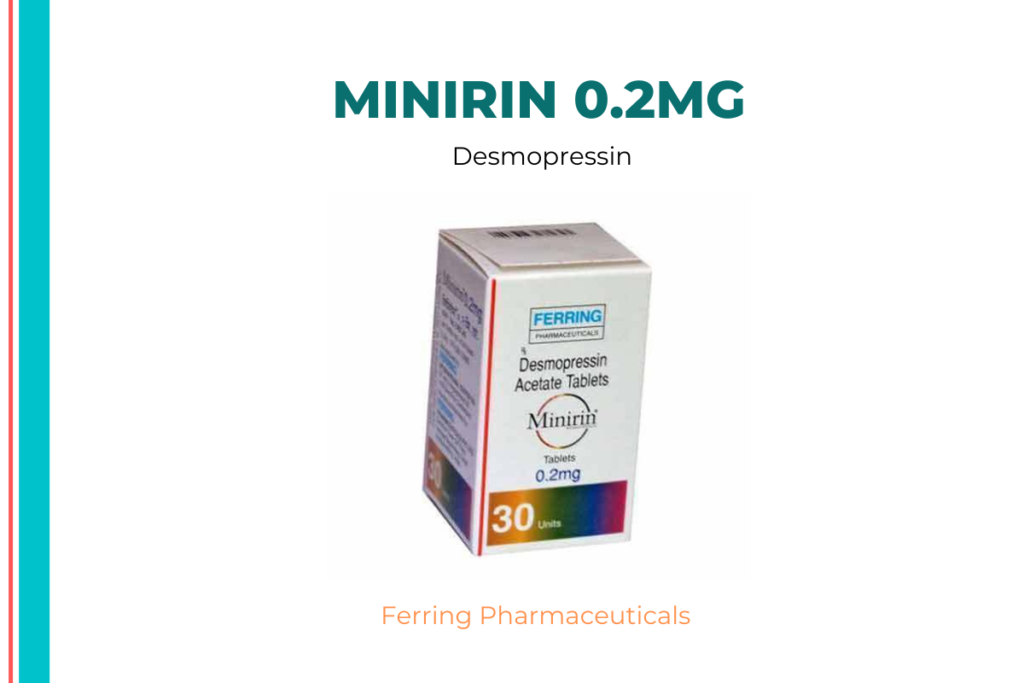Minirin 0.2 mg
Minirin 0.2 mg is a hormone analogue that belongs to the class of ‘antihemophilic agents.’ It is primarily used to treat diabetes insipidus, post-hypophysectomy polyuria (excessive urination), polydipsia (excessive thirst), and bedwetting. Minirin 0.2 mg is available as a tablet and is available in two strengths: 0.2 mg and 0.5 mg. Diabetes insipidus is a medical disorder in which the body’s ability to regulate water balance is impaired, resulting in excessive urine as a result. The surgical removal of the hypophysis is referred to as hypophysectomy (pituitary gland).
Minirin 0.2 mg includes Desmopressin, which is a synthetic variant of Vasopressin created by humans. Vasopressin is an antidiuretic hormone (one that regulates fluid balance) that is produced in the hypothalamus of the pituitary gland. It is responsible for the regulation of fluid balance. When your body is unable to create enough vasopressin, Minirin 0.2 mg is administered to compensate for a low vasopressin level in the blood. It works by mimicking the natural hormone vasopressin and reabsorbing water from the kidneys, which helps to regulate excessive thirst and urination in diabetics with diabetes insipidus (insipidus). It also has the additional benefit of reducing the volume of urine produced and controlling bedwetting in youngsters. Minirin 0.2 mg, as an anti-haemophilic medication, also has the additional effect of decreasing the bleeding propensity in patients with haemophilia (bleeding condition) by encouraging the release of blood clotting proteins.
Minirin 0.2 mg is available as an oral tablet, a sublingual tablet, an injection, and a nasal spray, among other dosage forms. Your doctor will determine the appropriate dosage for you based on your medical condition. Minirin 0.2 mg is associated with a variety of adverse effects, the most prevalent of which are headache, nausea, stomach cramp, and flushing (sense of warmth in the face, ears, neck, and trunk). Despite the fact that hardly everyone suffers these adverse effects, if they do occur, you should seek medical assistance right away.
You should inform your doctor prior to beginning Minirin 0.2 mg therapy that you are suffering from severe renal disease or hypernatremia (low sodium levels in your body), or that you have had acute thirst, uncontrolled high blood pressure, heart failure, or fluid retention in the past. While using Minirin 0.2 mg, restrict your consumption of water and other fluids since excessive water and other fluids might cause electrolyte imbalance. It is best not to drink caffeine-containing beverages before bedtime because it will cause you to urinate more frequently at night. Minirin 0.2 mg should not be used by pregnant or nursing women without first consulting their doctor. If your doctor has not instructed you to take or stop taking this medication, do not do so.
Minirin 0.2 mg is used for the treatment of diabetes insipidus, post-hypophysectomy polyuria (polydipsia), and bedwetting.

Advantages in terms of medicine
In addition to treating diabetes insipidus, Minirin 0.2 mg is also used to treat post-hypophysectomy polyuria (excessive urine) or polydipsia (excessive thirst), and it is also used to treat bedwetting. A synthetic form of the hormone vasopressin (antidiuretic hormone), Minirin 0.2 mg (also known as desmopressin), is included in the formulation. Minirin 0.2 mg works by limiting the amount of water eliminated in the urine, which helps to control excessive thirst and urination in patients with diabetes insipidus. It also reduces the volume of urine produced, which prevents the urinary bladder from filling up throughout the night and helps to manage bedwetting in children and other young people. Minirin 0.2 mg, as an anti-haemophilic medication, also has the additional effect of decreasing the bleeding propensity in patients with haemophilia (bleeding condition) by encouraging the release of blood clotting proteins.
Instructions on How to Use
Minirin 0.2 mg is available as an oral tablet, a sublingual tablet, an injection, and a nasal spray, among other dosage forms. Tablet: Swallow the tablet whole, with a glass of water, after it has been crushed. It should not be chewed, bit, or broken. Please follow the doctor’s instructions and take it with a meal if possible. Close one nostril by gently pushing on the side of your nose on which you want to use nasal drops. Now, carefully insert the spray bottle tip into the opposite nostril using your index finger. Take a deep breath in through that nostril while you press the bottle to release the medicinal drops from the bottle. In the opposite nostril, do the same thing as before. Minirin 0.2 mg is injected intravenously (into a vein) by a doctor or nurse who administers the medication. The pill should be placed under the tongue or in between the cheek and gum and allowed to dissolve. Sublingual tablet While a pill is dissolving, refrain from eating, drinking, smoking, or using chewing tobacco.
Storage
Store in a cool, dry location away from direct sunlight.
Minirin 0.2 mg has a number of side effects.
Headache
Nausea
Constipation in the abdomen
Flushing is a type of cleaning (sense of warmth in the face, ears, neck and trunk)
Drug Advises and Warnings
You should tell your doctor if you have a medical history of severe kidney disease, hypernatremia (low sodium levels in your body), extreme thirst, uncontrolled high blood pressure (heart failure), fluid/mineral imbalance (cystic fibrosis), bleeding/clotting problems, or fluid retention before you begin taking Desmopressin. While using Desmopressin, restrict your consumption of water and other fluids since excessive water and other fluids might cause electrolyte imbalance. It is best not to drink caffeine-containing beverages before bedtime because it will cause you to urinate more frequently at night. Minirin 0.2 mg may contain sugars such as lactose monohydrate, which is a simple sugar. Before using Desmopressin, tell your doctor if you have had any adverse reactions or if you have a lactose intolerance. Pre-eclampsia, a dangerous condition in pregnant women, can be caused by the hormone desmopressin. In addition to high blood pressure and swelling caused by fluid retention, pre-eclampsia can produce proteinuria, which is protein in the urine, which is dangerous for pregnant women to have. If you are pregnant or expecting to become pregnant, you should visit your doctor before beginning Minirin 0.2 mg treatment. When a nursing woman uses desmopressin, some of the medication is secreted in her breast milk. If you are a nursing mother, you should seek medical counsel before beginning treatment with Desmopressin. Keep Minirin 0.2 mg away from direct sunlight and refrigerate at temperatures ranging from 2°C to 8°C at all times. Minirin 0.2 mg should not be stored in the freezer.
Drug Interactions are a common occurrence.
A possible drug-drug interaction exists between desmopressin and fits medication (lamotrigine), antidepressants (escitalopram, fluoxetine, sertraline), and water tablets (diuretics) (furosemide).
Interaction between a drug and a food: Avoid alcoholic beverages since they may exacerbate side effects and cause increased urination.
Medications and Diseases Interactions: Before taking Desmopressin, tell your doctor if you have a medical history of kidney disease, hypernatremia (low sodium levels in your body), severe thirst, uncontrolled high blood pressure, heart failure, fluid/mineral imbalance (Cystic Fibrosis), bleeding/clotting issues, or fluid retention.
Safety Recommendations
ALCOHOL
Consuming alcohol is not recommended since it may exacerbate negative effects and cause more urination.
PREGNANCY
Minirin 0.2 mg is classified as a pregnancy category B medication. It can induce pre-eclampsia in pregnant women, which results in high blood pressure, oedema (swelling caused by the accumulation of fluid), and proteinuria (excess protein in the urine) (protein in the urine). If you are pregnant or expecting to become pregnant, you should visit your doctor before beginning Desmopressin treatment.
BREAST FEEDING
When a nursing woman uses desmopressin, some of the medication is secreted in her breast milk. If you are breastfeeding a child, you should obtain medical counsel before starting Desmopressin.
DRIVING
If you suffer any uncontrollable adverse effects while taking Desmopressin, you should avoid driving or using machinery.
LIVER
Before using Desmopressin, please inform your doctor of any past or current liver illness or liver impairment that you may be suffering from.
KIDNEY
If a patient has moderate to severe renal impairment, then desmopressin is contraindicated for them. In the event that you are prescribed Desmopressin, please inform your doctor if you have a history of renal illness.
No, there is no formation of habits.
Diet and Lifestyle Suggestions
If you use Desmopressin more than once a day, follow the doctor’s instructions and take the drug at regular intervals to avoid side effects. When using Desmopressin, do not take any additional over-the-counter drugs, herbal supplements, or vitamin supplements without first consulting your pharmacist or doctor.
Make sure to have a high-fiber diet that is also high in nutritious carbs such as fruits, vegetables, and whole grains.
Eat at regular intervals throughout the day.
Avoid consuming caffeine-containing beverages such as coffee, tea, cola, energy drinks, and other caffeinated beverages before night since it might cause excessive urination.
Avoid engaging in activities that induce dehydration, such as strenuous physical activity or spending extended periods of time in the sun.
Special Recommendation
To rule out the possibility of fluid imbalance, it is necessary to test electrolytes on a regular basis.
If you are urinating more frequently than usual, it is recommended that you see your endocrinologist to rule out any hormonal imbalances.
You may also be advised to undergo any CT or MRI scans in order to determine the health of your pituitary gland.
Your doctor may recommend that you undergo kidney function tests in order to check for any signs of renal impairment.
Other information: This item is non-returnable for any reason.
Glossary of Diseases and Conditions
Diabetes insipidus is a medical disorder in which the body’s ability to regulate fluid balance is impaired, resulting in excessive urine and thirst. Both of the following circumstances contribute to its development: A) Central diabetes insipidus is a disorder in which your pituitary gland does not create enough vasopressin to keep your blood sugar stable (an antidiuretic hormone that maintains fluid balance). Nephrogenic diabetes insipidus: Even if you produce adequate vasopressin, your kidneys may not respond to the vasopressin that is responsible for maintaining fluid balance in your blood.
Hypophysectomy is the surgical excision of the hypophysis (pituitary gland) in order to cure malignant or benign tumors of the pituitary gland.
FAQs
Desmopressin is a synthetic version of the hormone vasopressin that is found in Desmopressin (antidiuretic hormone). Desmopressin is used to replace vasopressin when your body is unable to create enough of it on its own. It aids in the treatment of diabetes insipidus, post-hypophysectomy polyuria or polydipsia, and bedwetting by increasing water reabsorption in the kidneys and decreasing the volume of urine that has to be filled up in the bladder, among other conditions..
Desmopressin is not associated with weight gain. However, because it reduces the quantity of fluid that is excreted by the urine, it may result in fluid overload as a side effect. A buildup of fluids might result in a significant increase in weight.
Desmopressin is not a treatment for bedwetting, although it can assist in controlling the condition. It is typically taken at night in order to prevent frequent urine from occurring.
Take the missing dosage as soon as possible after forgetting about it. If, on the other hand, it is time for the following dosage, omit the missed dose and return to your usual dosing plan.
It is essential that you drink enough of fluids. It is important to prevent excessive consumption of water and other liquids such as coffee, tea, cola, and energy drinks because this can increase the electrolyte imbalance.
Desmopressin is a medication that is used in cold-chain situations. Keep Desmopressin away from direct sunlight and refrigerate at temperatures ranging from 2°C to 8°C at all times. Purchase at your own risk, understanding that it should be kept cold and that transportation may have an impact on its quality. There will be no refunds or exchanges.






Leave a Reply
You must be logged in to post a comment.